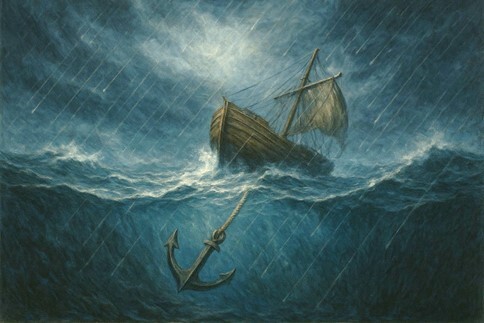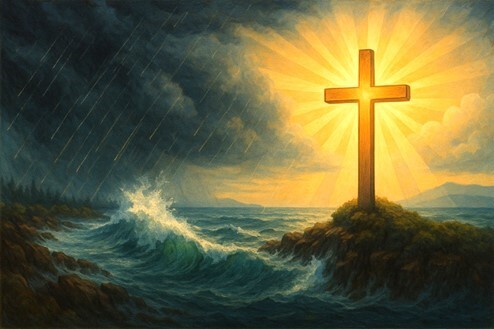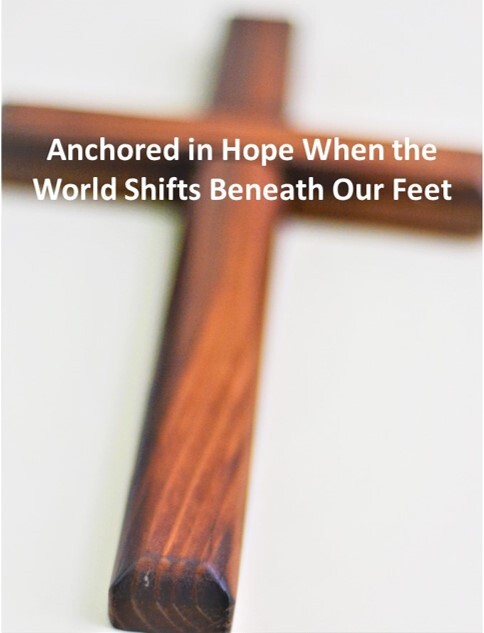Greetings in the name of the Father, the son, and the Holy Spirit.
“God is our refuge and strength,
an ever-present help in trouble.
Therefore we will not fear, though the earth give way
and the mountains fall into the heart of the sea.” – Psalm 46:1–2
It began with a tremor — not of the earth, but of the heart.
A retiree sits at his kitchen table early in the morning, coffee cooling beside him. He opens his savings statement and feels a quiet unease rise. What once seemed steady now looks uncertain. The market fluctuates, the cost of living climbs, and the comfort of security feels thinner than it used to.
A young graduate scrolls through headlines — wars, storms, and layoffs — and wonders, What kind of world am I stepping into? A mother stands at her window, watching her children play, and worries about what kind of future they will inherit in a world that feels increasingly fragile.
We all know this feeling — the uneasy realization that the ground beneath us isn’t as steady as it used to be. Economies wobble, technology changes faster than we can follow, and the moral compass of society seems to drift with every headline. Even nature itself groans with wildfires, floods, and droughts.
But the Bible never denies this reality. In fact, Scripture assumes that the world will shake. Psalm 46:2 says:
“Therefore we will not fear, though the earth give way and the mountains fall into the heart of the sea.”
Even when the foundations crumble, God remains unshaken. In the middle of all that shifting and shaking, He offers a promise — not that the tremors will stop, but that there is an anchor strong enough to hold.
Today, we will look at how we can remain anchored in hope when the world shifts beneath our feet.
1. The World Is Shifting — but God Is Not
The world we live in feels like it’s changing faster than we can keep up. The moral compass that once guided families now spins wildly in every direction. What was celebrated yesterday is questioned today. What was considered truth a generation ago is now dismissed as opinion. Political landscapes tremble, economies rise and fall, and even the climate itself seems to echo Paul’s words in Romans 8:22 — “The whole creation has been groaning as in the pains of childbirth.”
We live in an age of endless motion — new technologies, new crises, new fears. One headline replaces another before the last has even faded. Many quietly wonder: Is there anything left that doesn’t change?
But this feeling of instability is not unique to us. The early believers lived in days of violent persecution, shifting empires, and spiritual confusion. Yet in the midst of it all, the writer of Hebrews offered words that have anchored generations:
“We have this hope as an anchor for the soul, firm and secure.” (Hebrews 6:19)
This hope was not sentimental optimism or positive thinking. In Scripture, hope means a confident expectation built on God’s unchanging character. Hope is not based on what we see, but on Who we know.
When we look at the world, we see uncertainty. When we look at God, we see constancy. Scripture reminds us:
“I the Lord do not change; therefore you, O children of Jacob, are not consumed.” (Malachi 3:6)
“Jesus Christ is the same yesterday and today and forever.” (Hebrews 13:8)
Because God is unchanging, His promises are unbreakable. That is why the psalmist could say with confidence:
“God is our refuge and strength, an ever-present help in trouble. Therefore we will not fear, though the earth give way and the mountains fall into the heart of the sea.” (Psalm 46:1–2)
Even if the earth gives way, He does not. Even when the foundations shift, His Word stands.
Imagine a lighthouse on a storm-battered coast. Waves crash against its walls; wind howls around its tower. The sea roars and rages, but the lighthouse does not move. Through the darkest night, its light continues to shine — steady, unwavering, guiding every lost ship back toward safety.
That is the picture of God’s faithfulness. He is the same when the seas are calm and when the storms rage. The culture may change its course every season, but His truth does not drift.
When the market drops, when a diagnosis shatters a plan, when a trusted friend turns away — God’s promise remains: “I will never leave you nor forsake you.” (Hebrews 13:5)
The real danger is not that the world changes — it always has — but that our hearts anchor to things that cannot hold.
- If our anchor is in success, success can fade.
- If our anchor is in people, they can fail us.
- If our anchor is in control, it will slip through our hands.
But if our anchor is in Christ, it will hold — because He holds us.
As Isaiah 26:3 declares,
“You will keep in perfect peace those whose minds are steadfast, because they trust in You.”
The world may shift, but the One who holds it — and us — does not.
2. Hope Anchors Us in the Middle, Not the End
When people talk about hope, they often imagine something distant — a light at the end of the tunnel, a happy ending after a hard chapter. But true hope is not only about the destination; it’s the strength that keeps us walking when the tunnel feels endless. It’s what holds us steady in the middle, not just what greets us at the end.
Many in our world treat hope like a fragile wish: “I hope things get better.” “I hope it all works out.” But in Scripture, hope is never fragile — it’s a force. It’s the settled confidence that God is already working redemption, even when we can’t see it.
Romans 8 paints this picture powerfully:
“For in this hope we were saved. But hope that is seen is no hope at all. Who hopes for what they already have? But if we hope for what we do not yet have, we wait for it patiently.” (Romans 8:24–25)
Paul writes these words not from a place of comfort, but from struggle. The world he lived in was filled with pain, injustice, and uncertainty — yet he calls it “the groaning of creation”. Hope, then, is not the absence of groaning but the assurance that groaning is not the final word.
Sailors know that during a storm, they don’t fight the waves; they drop the anchor deep. The anchor doesn’t calm the sea, but it keeps the vessel from being swept away.
That’s what biblical hope does. It doesn’t remove the chaos around us — it holds us fast beneath it. Our hope reaches deeper than fear, deeper than despair, and latches onto the bedrock of God’s promises.
So when life feels like a storm — when the job disappears, when the diagnosis comes, when the prayer seems unanswered — hope whispers: You are not adrift. You are held.
The psalmist echoes this in Psalm 42:11:
“Why, my soul, are you downcast? Why so disturbed within me? Put your hope in God, for I will yet praise Him, my Savior and my God.”
Notice that phrase — “I will yet praise Him.” Hope looks forward with the assurance that the story isn’t finished.
In 1873, Horatio Spafford lost his four daughters in a tragic shipwreck. As he crossed the same Atlantic waters to meet his grieving wife, he penned the hymn “It Is Well with My Soul.”
“When peace like a river attendeth my way,
When sorrows like sea billows roll;
Whatever my lot, Thou hast taught me to say,
It is well, it is well with my soul.”
This story fits beautifully with your sermon’s message — the anchor holds in the storm.
It shows that faith can turn unbearable tragedy into testimony.
Hope doesn’t erase pain; it transforms it into endurance.
This is exactly what we see in the cross. When Jesus was nailed to the cross, it looked like hope had died. The disciples scattered. The world turned dark. But in that very moment of apparent defeat, the deepest anchor was being set.
What the world saw as the end, God declared as the beginning. The resurrection was not a surprise plot twist — it was the fulfillment of a promise that hope had never left the story.
That’s why the writer of Hebrews says of Jesus:
“He has entered the inner place behind the curtain, where Jesus has gone as a forerunner on our behalf.” (Hebrews 6:19–20)
That word forerunner means One who goes first to make the way safe for others. Our anchor doesn’t stay on the surface — it reaches all the way into heaven, to the very presence of God Himself.
Sometimes we pray, “Lord, take me out of this storm.” But more often, God answers, “I’ll be your anchor in it.”
He doesn’t promise to remove every trial, but He promises His presence through every one. As Isaiah 43:2 declares:
“When you pass through the waters, I will be with you; and when you pass through the rivers, they will not sweep over you.”
That’s hope in the middle — not denial of reality, but defiance of despair.
So we hold on. Not because we’re strong, but because He is faithful.
Even when we can’t see the shoreline, we can trust the One who commands the waves.
3. Living as Anchored People in a Drifting World
If our hope is secure in Christ, then our lives should look different from those who are tossed by every wave. Hope is not a theory to be admired — it is a way of life to be lived. When we are anchored in Christ, that anchor changes how we stand, how we speak, and how we love in a drifting world.
Paul wrote to the Philippians from a prison cell, yet his words are filled with joy and steadiness:
“I have learned to be content whatever the circumstances. I know what it is to be in need, and I know what it is to have plenty. I have learned the secret of being content in any and every situation… I can do all this through Him who gives me strength.” (Philippians 4:11-13)
That’s what it means to live anchored. Paul’s surroundings were unstable, but his soul was not. His anchor was not chained to comfort or success — it was fastened to Christ.
a. Anchored People Live with Peace in Uncertainty
In a restless age of anxiety and noise, anchored believers radiate a peace that doesn’t make sense to the world.
“Do not be anxious about anything,” Paul says, “but in every situation, by prayer and petition, with thanksgiving, present your requests to God. And the peace of God, which transcends all understanding, will guard your hearts and minds in Christ Jesus.” (Philippians 4:6-7)
That word guard is a military term — it means to post a sentry. God’s peace literally stands watch over our minds when fear tries to invade.
This doesn’t mean we never feel afraid. It means we bring our fears to the One stronger than them. Peace is not the absence of trouble; it is the presence of God in the midst of it.
b. Anchored People Live with Compassion in Chaos
When storms rage, people instinctively turn inward. Fear shrinks the heart. But hope expands it. Anchored people look outward because they know that love, not fear, defines who they are.
In the second century, a plague swept through the Roman Empire. While many citizens fled the cities, the Christians stayed. They cared for the sick and buried the dead, often at great personal risk. One historian wrote that the faith of these believers “spread like fire” because the world saw their peace and compassion amid chaos.
When our world feels divided and fearful, the church’s greatest witness is not in arguments or headlines, but in simple acts of love — listening to a neighbor, serving the needy, forgiving the undeserving. Every act of mercy is a ripple from the anchor of hope.
“Let your light shine before others,” Jesus said, “that they may see your good deeds and glorify your Father in heaven.” (Matthew 5:16)
c. Anchored People Live with Vision Beyond the Horizon
Hope gives us endurance not only to survive but to serve with purpose. When we know our anchor is secure, we can dream courageously and act boldly for God’s kingdom.
Romans 8:21 speaks of a creation that “will be liberated from its bondage to decay and brought into the freedom and glory of the children of God.” Every faithful act — every prayer, every kindness, every gospel seed planted — becomes part of that liberation story.
Anchored people don’t just wait for heaven; they live as previews of it.
A ship’s anchor is connected by a chain or rope — what sailors call the rode. The anchor alone can’t hold the vessel unless the rope keeps it attached. Faith is that rope. God provides the anchor — Christ Himself — but faith is what keeps our lives fastened to Him.
That’s why prayer, Scripture, and fellowship aren’t just spiritual habits; they’re lifelines. They keep us connected when storms tug hard against our souls.
“So then, just as you received Christ Jesus as Lord, continue to live your lives in Him, rooted and built up in Him, strengthened in the faith as you were taught, and overflowing with thankfulness.” (Colossians 2:6-7)
To live anchored is to live rooted — steady in truth, rich in love, resilient in faith.
In a drifting world, anchored people become living lighthouses — calm, constant, quietly pointing others toward the harbor of Christ.
Summary: Anchored in Christ: A Firm Foundation for the Unsteady Heart
When life shakes beneath our feet, the message of Christ offers not escape from storms but strength to endure them. Faith does not promise calm seas; it promises that when the winds rise, our souls will not be swept away. The question is not if the storms will come, but where we will stand when they do.
Jesus told a story of two builders — one on sand, one on rock. Both faced the rain, the floods, and the wind. Only the one anchored on the rock endured. In the same way, when our hope rests on possessions, status, or strength, it will crumble when the world shifts. But when our hope rests on Christ — on His cross, His resurrection, and His unchanging love — our faith stands firm through every trial.
At the cross, Jesus bore the storm of judgment and sin so we could find peace that no storm can take away. When He rose again, He set the anchor of hope forever. The gospel, therefore, is not mere encouragement; it is good news. The debt has been forgiven, the storm of sin silenced, and the door to eternal peace opened.
If your heart feels weary or unsteady, know this: the anchor is already there. You don’t need to be perfect — just willing to trust. Jesus still invites, “Come to Me, all you who are weary and burdened, and I will give you rest.” (Matthew 11:28)
Throughout history, God’s people have faced countless tremors — from Noah’s flood to David’s exile, from the early church’s persecution to today’s uncertainty. Yet through it all, God has remained faithful.
“When my heart is overwhelmed, lead me to the rock that is higher than I.” (Psalm 61:2)
So when your world trembles, remember:
- The world may change, but God does not.
- The storm may rage, but the anchor holds.
- The future may be uncertain, but the One who holds it is sure.
Hope in Christ remains — steadfast, unshaken, and eternal.
Let’s pray together.
Lord, when the world around us shakes,
remind us that You are the rock beneath our feet.
Forgive us for trusting in things that fade — our success, our control, our own strength.
Anchor us again in Your unchanging love.
Strengthen those who feel adrift today — the anxious, the lonely, the grieving, the uncertain.
Speak to their hearts, “Peace, be still.” (Mark 4:39)
Let Your church, O God, stand as a lighthouse in the storm — steady, compassionate, radiant with Your truth and grace.
May our hope in Christ hold firm until that day when every storm is stilled
and every tear is wiped away.
In Jesus’ name, Amen.
“Let us hold unswervingly to the hope we profess,
for He who promised is faithful.” – Hebrews 10:23





